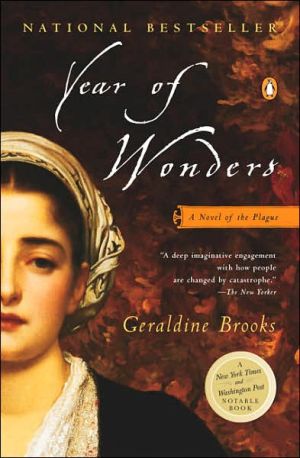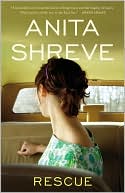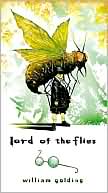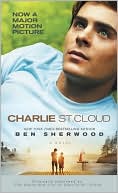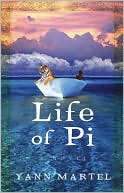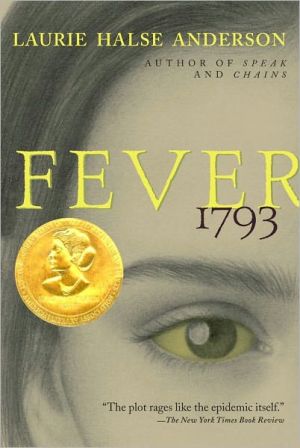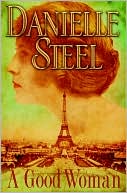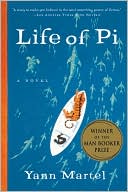Year of Wonders: A Novel of the Plague
When an infected bolt of cloth carries plague from London to an isolated village, a housemaid named Anna Frith emerges as an unlikely heroine and healer. Through Anna's eyes we follow the story of the fateful year of 1666, as she and her fellow villagers confront the spread of disease and superstition. As death reaches into every household and villagers turn from prayers to murderous witch-hunting, Anna must find the strength to confront the disintegration of her community and the lure of...
Search in google:
When an infected bolt of cloth carries plague from London to an isolated village, a housemaid named Anna Frith emerges as an unlikely heroine and healer. Through Anna's eyes we follow the story of the fateful year of 1666, as she and her fellow villagers confront the spread of disease and superstition. As death reaches into every household and villagers turn from prayers to murderous witch-hunting, Anna must find the strength to confront the disintegration of her community and the lure of illicit love. As she struggles to survive and grow, a year of catastrophe becomes instead annus mirabilis, a "year of wonders." Inspired by the true story of Eyam, a village in the rugged hill country of England, Year of Wonders is a richly detailed evocation of a singular moment in history. Written with stunning emotional intelligence and introducing "an inspiring heroine" (The Wall Street Journal), Brooks blends love and learning, loss and renewal into a spellbinding and unforgettable read. "The novel glitters . . . A deep imaginative engagement with how people are changed by catastrophe." (The New Yorker) "Year of Wonders is a vividly imagined and strangely consoling tale of hope in a time of despair." (O, The Oprah Magazine) "Brooks proves a gifted storyteller as she subtly reveals how ignorance, hatred and mistrust can be as deadly as any virus. . . . Year of Wonders is itself a wonder." (People )Arthur Golden...leaves us with the memory of vivid characters struggling in timeless human ways with the hardships confronting them....An engaging story.
Year of Wonders, Chapter One\ Apple-picking Time\ I used to love this season. The wood stacked by the door, the tang of its sap still speaking of forest. The hay made, all golden in the low afternoon light. The rumble of the apples tumbling into the cellar bins. Smells and sights and sounds that said this year it would be all right: there'd be food and warmth for the babies by the time the snows came. I used to love to walk in the apple orchard at this time of the year, to feel the soft give underfoot when I trod on a fallen fruit. Thick, sweet scents of rotting apple and wet wood. This year, the hay stooks are few and the woodpile scant, and neither matters much to me.\ They brought the apples yesterday, a cartload for the rectory cellar. Late pickings, of course: I saw brown spots on more than a few. I had words with the carter over it, but he told me we were lucky to get as good as we got, and I suppose it's true enough. There are so few people to do the picking. So few people to do anything. And those of us who are left walk around as if we're half asleep. We are all so tired.\ I took an apple that was crisp and good and sliced it, thin as paper, and carried it into that dim room where he sits, still and silent. His hand is on the Bible, but he never opens it. Not anymore. I asked him if he'd like me to read it to him. He turned his head to look at me, and I started. It was the first time he'd looked at me in days. I'd forgotten what his eyes could do-what they could make us do-when he stared down from the pulpit and held us, one by one, in his gaze. His eyes are the same, but his face has altered so, drawn and haggard, each line etched deep. When he came here, just three years since, the whole village made a jest of his youthful looks and laughed at the idea of being preached at by such a pup. If they saw him now, they would not laugh, even if they could remember how to do so.\ "You cannot read, Anna."\ "To be sure, I can, Rector. Mrs. Mompellion taught me."\ He winced and turned away as I mentioned her, and instantly I regretted it. He does not trouble to bind his hair these days, and from where I stood the long, dark fall of it hid his face, so that I could not read his expression. But his voice, when he spoke again, was composed enough. "Did she so? Did she so?" he muttered. "Well, then, perhaps one day I'll hear you and see what kind of a job she made of it. But not today, thank you, Anna. Not today. That will be all."\ A servant has no right to stay, once she's dismissed. But I did stay, plumping the pillow, placing a shawl. He won't let me lay a fire. He won't let me give him even that little bit of comfort. Finally, when I'd run out of things to pretend to do, I left him.\ In the kitchen, I chose a couple of the spotted apples I'd culled from the buckets and walked out to the stables. The courtyard hadn't been swept in a sennight. It smelled of rotting straw and horse piss. I had to hitch up my skirt to keep it off the muck. Before I was halfway across, I could hear the thud of his horse's rump as he turned and strutted in his confinement, gouging clefts into the floor of the stall. There's no one strong or skilled enough now to handle him.\ The stable boy, whose job it was to keep the courtyard raked, was asleep on the floor of the tack room. He jumped when he saw me, making a great show of searching for the snath that had slipped from his hand when he'd dozed off. The sight of the scythe blade still upon his workbench vexed me, for I'd asked him to mend it long since, and the timothy now was naught but blown seed head and no longer worth the cutting. I was set to scold him about this, and about the filth outside, but his poor face, so pinched and exhausted, made me swallow the words.\ Dust motes sparkled in the sudden shaft of sunlight as I opened the stable door. The horse stopped his pawing, holding one hoof aloft and blinking in the unfamiliar glare. Then he reared up on his muscled haunches and punched the air, saying, as plainly as he could, "If you aren't him, get out of here." Although I don't know when a brush was last laid on him, his coat still gleamed like bronze where the light touched it. When Mr. Mompellion had arrived here on this horse, the common talk had been that such a fine stallion was no fit steed for a priest. And people liked not to hear the rector calling him Anteros, after one of the old Puritans told them it was the name of a pagan idol. When I made so bold as to ask Mr. Mompellion about it, he had only laughed and said that even Puritans should recall that pagans, too, are children of God and their stories part of His creation.\ I stood with my back pressed against the stall, talking gently to the great horse. "Ah, I'm so sorry you're cramped up in here all day. I brought you a small something." Slowly, I reached into the pocket of my pinafore and held out an apple. He turned his massive head a little, showing me the white of one liquid eye. I kept prattling, softly, as I used to with the children when they were scared or hurt. "You like apples. I know you do. Go on, then, and have it." He pawed the ground again, but with less conviction. Slowly, his nostrils flaring as he studied the scent of the apple, and of me, he stretched his broad neck toward me. His mouth was soft as a glove, and warm, as it brushed my hand, taking the apple in a single bite. As I reached into my pocket for the second one, he tossed his head and the apple juice sprayed. He was up now, angrily boxing the air, and I knew I'd lost the moment. I dropped the other apple on the floor of the stall and slid out quickly, resting my back against the closed door, wiping a string of horse spittle from my face. The stable boy slid his eyes at me and went silently on with his mending.\ Well, I thought, it's easier to bring a small comfort to that poor beast than it is to his master. When I came back into the house, I could hear the rector out of his chair, pacing. The rectory floors are old and thin, and I could follow his steps by the creak of the boards. Up and back he walked, up and back, up and back. If only I could get him downstairs, to do his pacing in the garden. But once, when I suggested it, he looked as if I'd proposed something as ambitious as a trek up the White Peak. When I went to fetch his plate, the apple slices were all there, untouched, turning brown. Tomorrow, I'll start to work with the cider press. He'll take a drink without noticing sometimes, even when I can't get him to eat anything. And it's no use letting a cellar full of fruit go bad. If there's one thing I can't stand anymore, it's the scent of a rotting apple.\ • *\ •\ At day's end, when I leave the rectory for home, I prefer to walk through the orchard on the hill rather than go by the road and risk meeting people. After all we've been through together, it's just not possible to pass with a polite, "Good night t'ye." And yet I haven't the strength for more. Sometimes, not often, the orchard can bring back better times to me. These memories of happiness are fleeting things, reflections in a stream, glimpsed all broken for a second and then swept away in the current of grief that is our life now. I can't say that I ever feel what it felt like then, when I was happy. But sometimes something will touch the place where that feeling was, a touch as slight and swift as the brush of a moth's wing in the dark.\ In the orchard of a summer night, if I close my eyes, I can hear the small voices of children: whispers and laughter, running feet and rustling leaves. Come this time of year, it's Sam that I think of-strong Sam Frith grabbing me around the waist and lifting me into the low, curved branch of a gnarly, old tree. I was just fifteen. "Marry me," he said. And why wouldn't I? My father's croft had ever been a joyless place. My father loved a pot better than he loved his children, though he kept on getting them, year passing year. To my stepmother, Aphra, I was always a pair of hands before I was a person, someone to toil after her babies. Yet it was she who spoke up for me, and it was her words that swayed my father to give his assent. In his eyes I was but a child still, too young to be handfasted. "Open your eyes, husband, and look at her," said Aphra. "You're the only man in the village who doesn't. Better she be wedded early to Frith than bedded untimely by some youth with a prick more upright than his morals."\ Sam Frith was a miner with his own good lead seam to work. He had a fine small cottage and no children from a first wife who'd died. It did not take him long to give me children. Two sons in three years. Three good years. I should say, for there are many now too young to remember it, that it was not a time when we were raised up thinking to be happy. The Puritans, who are few amongst us now, and sorely pressed, had the running of this village then. It was their sermons we grew up listening to in a church bare of adornment, their notions of what was heathenish that hushed the Sabbath and quieted the church bells, that took the ale from the tavern and the lace from the dresses, the ribands from the Maypole and the laughter out of the public lanes. So the happiness I got from my sons, and from the life that Sam provided, burst on me as sudden as the first spring thaw. When it all turned to hardship and bleakness again, I was not surprised. I went calmly to the door that terrible night with the torches smoking and the voices yelling and the men with their faces all black so that they looked headless in the dark. The orchard can bring back that night, too, if I let my mind linger there. I stood in the doorway with the baby in my arms, watching the torches bobbing and weaving crazy lines of light through the trees. "Walk slow," I whispered. "Walk slow, because it won't be true until I hear the words." And they did walk slow, trudging up that little hill as if it were a mountain. But slow as they came, in the end they arrived, jostling and shuffling. They pushed the biggest one, Sam's friend, out in front. There was a mush of rotten apple on his boot. Funny thing to notice, but I suppose I was looking down so that I wouldn't have to look into his face.\ They were four days digging out Sam's body. They took it straight to the sexton's instead of bringing it home to me. They tried to keep me from it, but I wouldn't be kept. I would do that last thing for him. She knew. "Tell them to let her go to him," Elinor Mompellion said to the rector in that gentle voice of hers. Once she spoke, it was over. She so rarely asked anything of him. And once Michael Mompellion nodded, they parted, those big men, moving aside and letting me through.\ To be sure, there wasn't much there that was him. But what there was, I tended. That was two years ago. Since then, I've tended so many bodies, people I loved and people I barely knew. But Sam's was the first. I bathed him with the soap he liked, because he said it smelled of the children. Poor slow Sam. He never quite realized that it was the children who smelled of the soap. I washed them in it every night before he came home. I made it with heather blooms, a much gentler soap than the one I made for him. His soap was almost all grit and lye. It had to be, to scrape that paste of sweat and soil from his skin. He would bury his poor tired face in the babies' hair and breathe the fresh scent of them. It was the closest he got to the airy hillsides. Down in the mine at daybreak, out again after sundown. A life in the dark. And a death there, too.\ And now it is Elinor Mompellion's Michael who sits all day in the dark, with the shutters closed. And I try to serve him, although sometimes I feel that I'm tending just another in that long procession of dead. But I do it. I do it for her. I tell myself I do it for her. Why else would I do it, after all?
\ From Barnes & NobleBarnes & Noble Discover Great New Writers\ In Year of Wonders, Geraldine Brooks chronicles life in a tiny English village in the year 1666. What makes this "year of wonders" so fascinating is that it was the year in which an outbreak of bubonic plague struck England. Brooks's novel is based on the historical village of Eyam in the Pennine Mountains, whose denizens were challenged by their local vicar to quarantine themselves to avoid further spread of the disease throughout the countryside. As the villagers doom themselves to near-eradication (two-thirds of them will perish before year's end), the story raises compelling questions about human nature. \ The harrowing story of these brave souls is recounted by one Anna Frith, a maid in the charismatic vicar's household. Having watched helplessly as her own family succumbs one by one to the virulent plague, Anna is utterly devoted to the minister's teachings; but as the virus begins to recede, she begins to doubt his entreaty. Like many great historical novels, Year of Wonders will leave readers mulling over its essential questions long after they've finished the book. (Fall 2001 Selection)\ \ \ \ \ \ Arthur Golden...leaves us with the memory of vivid characters struggling in timeless human ways with the hardships confronting them....An engaging story.\ \ \ Library JournalIn 1666 the bubonic plague appeared in a small mountain village in England, where it took hold and spread. In a novel and courageous effort to keep the disease from extending beyond the village, the local minister and his congregation took a sacred oath to quarantine themselves until the illness was spent. Brooks has used this piece of history as a framework for her fictional account of what it might have been like to live through the event. Told by Anna Frith, the housemaid for the minister and his wife, this is a tale of devastation, grief, and madness as well as the attempts, both medicinal and spiritual, by the townspeople to combat the disease. The author has captured the various human responses to grief, fear, hopelessness, and exhaustion. Characters are well drawn, showing both the good and evil sides of human nature. Compelling and believable, the unabridged version is masterfully read by Josephine Bailey; the abridged set is equally well narrated by Stina Nielsen. Recommended. Joanna M. Burkhardt, Coll. of Continuing Education Lib., Univ. of Rhode Island, Providence Copyright 2002 Cahners Business Information.\ \ \ \ \ School Library JournalAdult/High School-Brooks's title is based on the actual lead-mining village of Eyam, Derbyshire, whose inhabitants voluntarily quarantined themselves for a year when stricken with Bubonic Plague in 1665-1666. Anna Frith is widowed at 18 by a mining accident and is the mother of two young boys. Through her recollections, readers live through the year as her endurance and abilities are sorely tested. Anna works for the new young minister's wife, who teaches her to read and becomes more of a companion than a mistress. At her employers' suggestion, Anna takes in a boarder to help meet expenses. The man is a tailor and when a shipment of fabrics, apparently flea infested, is delivered from London-the plague is suddenly upon them. The minister convinces his flock to make the supreme sacrifice and arranges for food and supplies to be delivered to the outskirts of the hamlet. The story is a portrait of the best and worst in people faced with sorrow, terror, and death. Some succumb to madness, others display cowardice and hysteria, and a few look for solutions in murder or self-mutilation. Through it all, however, Anna grows in strength, abilities, and understanding as she faces the loss of her children, her friends, and her innocence, and takes on the tasks of an ever-dwindling populace. This is an excellently portrayed study of the wonder of human courage.-Carol DeAngelo, Kings Park Library, Burke, VA Copyright 2001 Cahners Business Information.\ \ \ \ \ Kirkus ReviewsPainstaking re-creation of 17th-century England, swallowed by over-the-top melodramatics: a wildly uneven first novel by an Australian-born journalist. The Year of the title is 1665: the date of the devastating bubonic epidemic chronicled in Daniel Defoe's A Journal of the Plague Year. Brooks's tale, framed by reveries set a year and a half after the plague burns itself out (in "Leaf-Fall, 1666"), is narrated by Anna Frith, an earnest and highly intelligent young widow who buries her own multiple bereavements (first her gentle husband, later their two small sons) in work, aiding her (unnamed) village rector's wife in treating the sick with medicinal herbs and traditional cures. Brooks is at her best in lyrical, precise descriptions of country landscapes and village customs, and makes something very appealing and (initially) quite credible out of Anna's wary hunger for learning and innate charitable kindness. But the novel goes awry when the panic of contagion isolates her village from neighboring hamlets, a forthright young woman and her distracted aunt are accused of witchcraft and hunted down, and Anna's drunken, violent father, who profits as a gravedigger for hire, resorts to providing corpses that will require his services. The excesses continue, as Anna's stepmother, crazed with grief, seeks vengeance against rector Michael Mompellion and his saintly wife (and Anna's mentor and soulmate) Elinor, and rise to a feverish pitch when Anna, having found a new innocent victim to nurture and raise, offends the powerful Bradford family and must flee to safety-ending up (in a borderline-risible Epilogue) in North Africa in the sanctuary of a kindly "Bey's" harem. It's all more thana bit much: Thomas Hardy crossed with Erskine Caldwell, with more than a whiff of Jane Eyre in Anna's conflicted devotion to the brooding, Mr. Rochester-like Mompellion. In between the more hysterical moments, Brooks writes quite beautifully. But Year of Wonders was a mistake.\ \
